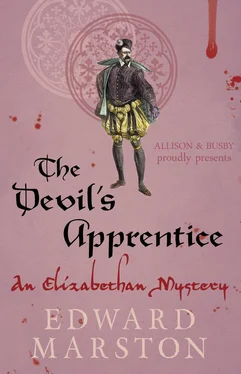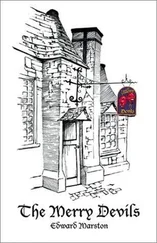Edward Marston - The Devil's Apprentice
Здесь есть возможность читать онлайн «Edward Marston - The Devil's Apprentice» весь текст электронной книги совершенно бесплатно (целиком полную версию без сокращений). В некоторых случаях можно слушать аудио, скачать через торрент в формате fb2 и присутствует краткое содержание. Год выпуска: 2014, ISBN: 2014, Издательство: Allison & Busby, Жанр: Исторический детектив, на английском языке. Описание произведения, (предисловие) а так же отзывы посетителей доступны на портале библиотеки ЛибКат.
- Название:The Devil's Apprentice
- Автор:
- Издательство:Allison & Busby
- Жанр:
- Год:2014
- ISBN:9780749015169
- Рейтинг книги:4 / 5. Голосов: 1
-
Избранное:Добавить в избранное
- Отзывы:
-
Ваша оценка:
- 80
- 1
- 2
- 3
- 4
- 5
The Devil's Apprentice: краткое содержание, описание и аннотация
Предлагаем к чтению аннотацию, описание, краткое содержание или предисловие (зависит от того, что написал сам автор книги «The Devil's Apprentice»). Если вы не нашли необходимую информацию о книге — напишите в комментариях, мы постараемся отыскать её.
The Devil's Apprentice — читать онлайн бесплатно полную книгу (весь текст) целиком
Ниже представлен текст книги, разбитый по страницам. Система сохранения места последней прочитанной страницы, позволяет с удобством читать онлайн бесплатно книгу «The Devil's Apprentice», без необходимости каждый раз заново искать на чём Вы остановились. Поставьте закладку, и сможете в любой момент перейти на страницу, на которой закончили чтение.
Интервал:
Закладка:
On a signal from Nicholas Bracewell, the musicians began to play in the gallery and the heavy murmur in the hall quickly died out. Owen Elias then swept out on stage to deliver the Prologue and to harvest the first laughter of the evening. When the curtains were drawn right back, Double Deceit began in earnest. Its plot was lifted from a play by Plautus. Two pairs of identical twins were involved in an endless series of merry escapades. Mistaken identities time and again brought howls of mirth from the audience. What made the performance especially memorable was the fact that Lawrence Firethorn and Barnaby Gill each played a pair of twins, leaving the stage as Argos and Silvio of Rome, respectively, only to reappear almost instantly as Argos and Silvio of Florence. Swift changes of costume were vital and Davy was kept busy taking one cloak and hat from Firethorn while handing him replacements, only to give him the original items when he reverted from Florence to Rome again. Standing beside him, George Dart was supplying the changes of costume for Gill, the morose servant to one Argos and the irrepressible jester to the other.
Timing was faultless. Everything was done so expertly that the spectators thought they were watching four actors playing the central roles instead of two. Appreciative laughter never ceased. Some of the bawdry spread blushes among the ladies but the men roared uncontrollably. Subtle innuendo was a form of humour that appealed to husbands and wives with equal success. Double Deceit was a triumphant romp, working its double deceit on an audience comprising friends and relations of Sir Michael and Lady Eleanor, some of whom had never seen a theatrical performance before and who were completely enthralled by the novel experience. When Act Five rose to its climax, both sets of twins appeared on stage together for the first time. Owen Elias, wearing a costume identical to that of Firethorn’s, looked remarkably like him while James Ingram, dressed to duplicate Gill, was a more than passable imitation.
It was left to Firethorn to deliver the Epilogue, a sixteen-line speech in rhyming couplets that rounded off the play with a mixture of wit and wisdom. Proud of the way that his company had responded to the challenge and delighted with his own double performances, the actor stepped forward to the edge of the stage, cleared his throat and opened his mouth to let the words spring forth. But none came. No matter how hard he tried, Firethorn could produce no more than a faint croak. He clutched at his neck and even poked a finger down his throat but they were futile gestures. What made his predicament worse was the fact that the spectators, assuming his antics were all part of the play, laughed afresh and even applauded when he grimaced as he made one final effort to declaim the elusive Epilogue.
Barnaby Gill eventually came to his rescue. Pushing him aside, the clown did a little dance by way of introduction then invented a couplet to cover the embarrassment of his silent colleague.
‘Good friends, let merry servants have their day,
I’ll say the words my master cannot say.’
The sixteen original lines now followed, delivered with comic effect by a man who had heard them so often that they were imprinted on his memory. Firethorn was horrified to see his rival stealing his lines and taking a first drink of the applause that burst out. At the same time, however, he recognised that Gill had been their saviour and steeled himself to thank the man when his voice returned. It was baffling. Firethorn was in no pain yet he could not utter a single word. When the company quit the stage, he led them back on again to take their bow, beaming graciously at his hosts who sat in the front row then going through his range of elaborate gestures. Gill could not resist adding insult to injury. As the pair of them came into the tiring-house, he turned to Firethorn.
‘Learn your lines, man,’ he scolded. ‘At least do something correctly.’
Nicholas Bracewell knew that the problem was serious. Whatever else he might do, Firethorn would never forget his lines, still less yield up an opportunity for Gill to say them in his stead. Seeing the mingled fury and helplessness in Firethorn’s eyes, he swiftly intervened before Gill’s mockery provoked Argos of Rome and of Florence to violence. When he took the stricken actor aside, they were joined by Edmund Hoode.
‘What happened, Lawrence?’ asked Hoode. ‘You know that speech backwards.’
Firethorn used a finger to jab wildly at his throat.
‘Have you lost your voice?’ said Nicholas, getting an energetic nod in return. ‘Can you say nothing at all?’ A despairing shake of the head came in reply. ‘But you had no difficulty at all in the course of the play itself.’
Firethorn tried to explain his dilemma with a series of vivid gestures.
Hoode was bewildered. ‘What’s wrong with him, Nick?’
‘I don’t know,’ admitted Nicholas, ‘but I think he needs a doctor.’
‘Nothing like this has ever happened before. Lawrence is invincible.’
‘That’s no longer the case, Edmund. Or so it seems. First, he has a high fever; then he collapses during the sermon in church; and now this.’
Firethorn nodded his agreement and gesticulated wildly. When other members of the company came over to see how he was, Nicholas waved them away, assuring them that their leader was simply tired and needed a rest. Few were persuaded by the book holder’s words. The ebullient actor never tired. Concerned for his state of health, they began to change out of their costumes. Only Gill tried to exploit his colleague’s distress. When he had shed the garments he wore as Silvio of Rome, he drifted across to the three men and spoke with a lordly air.
‘Lawrence’s lapse may yet be turned to good account,’ he said, preening himself. ‘I think it better from now on if Silvio always delivers the Epilogue to show that the tables have turned and that the master is subservient to the man. What do you think?’
‘I think it a monstrous idea,’ said Hoode.
‘And a singularly inappropriate one,’ added Nicholas.
Gill ignored them both. ‘What about you, Lawrence? You saw how well they received my Epilogue. Will you give the lines to one who says them properly?’
Unable to speak, Firethorn lurched at Gill with hands outstretched to grab him by the throat. Nicholas and Hoode restrained him just in time. Gill skipped out of reach and gave a brittle laugh. He was revelling in his moment of triumph. When most of the others had drifted away, Firethorn sat forlornly on a bench, head in hands. Hoode tried in vain to comfort him. Nicholas first supervised the removal of scenery and properties from the stage before returning to his friends. He was about to console Firethorn when Sir Michael came tripping into the room in high excitement.
‘Where is he?’ he cried. ‘Where is that magician called Lawrence Firethorn?’
‘Over here, Sir Michael,’ said Nicholas.
Their host hurried across to them. ‘Oh, sir. Forgive my delay in coming to congratulate you but I was trapped under an avalanche of compliments from my guests. They found the play both hilarious and enchanting. From your pen, I hear, Master Hoode.’
Hoode gave a nod. ‘Even so, Sir Michael.’
‘Then you, too, deserve unlimited praise. The play and the performance were above reproach. In the dual roles of Silvio, Master Firethorn, you were superb.’ The actor smiled for the first time since coming into the tiring-house. ‘That device at the end was masterly, sir, pretending to lose your voice like that so that the lowly servant had to deliver the Epilogue. Your gestures and expressions were so wonderfully lifelike.’
His face a mask of anger, Firethorn’s gestures were so openly hostile that Nicholas had to stand in front of him to shield him from their host. He smiled gently at Sir Michael and held up both palms in apology.
Читать дальшеИнтервал:
Закладка:
Похожие книги на «The Devil's Apprentice»
Представляем Вашему вниманию похожие книги на «The Devil's Apprentice» списком для выбора. Мы отобрали схожую по названию и смыслу литературу в надежде предоставить читателям больше вариантов отыскать новые, интересные, ещё непрочитанные произведения.
Обсуждение, отзывы о книге «The Devil's Apprentice» и просто собственные мнения читателей. Оставьте ваши комментарии, напишите, что Вы думаете о произведении, его смысле или главных героях. Укажите что конкретно понравилось, а что нет, и почему Вы так считаете.












